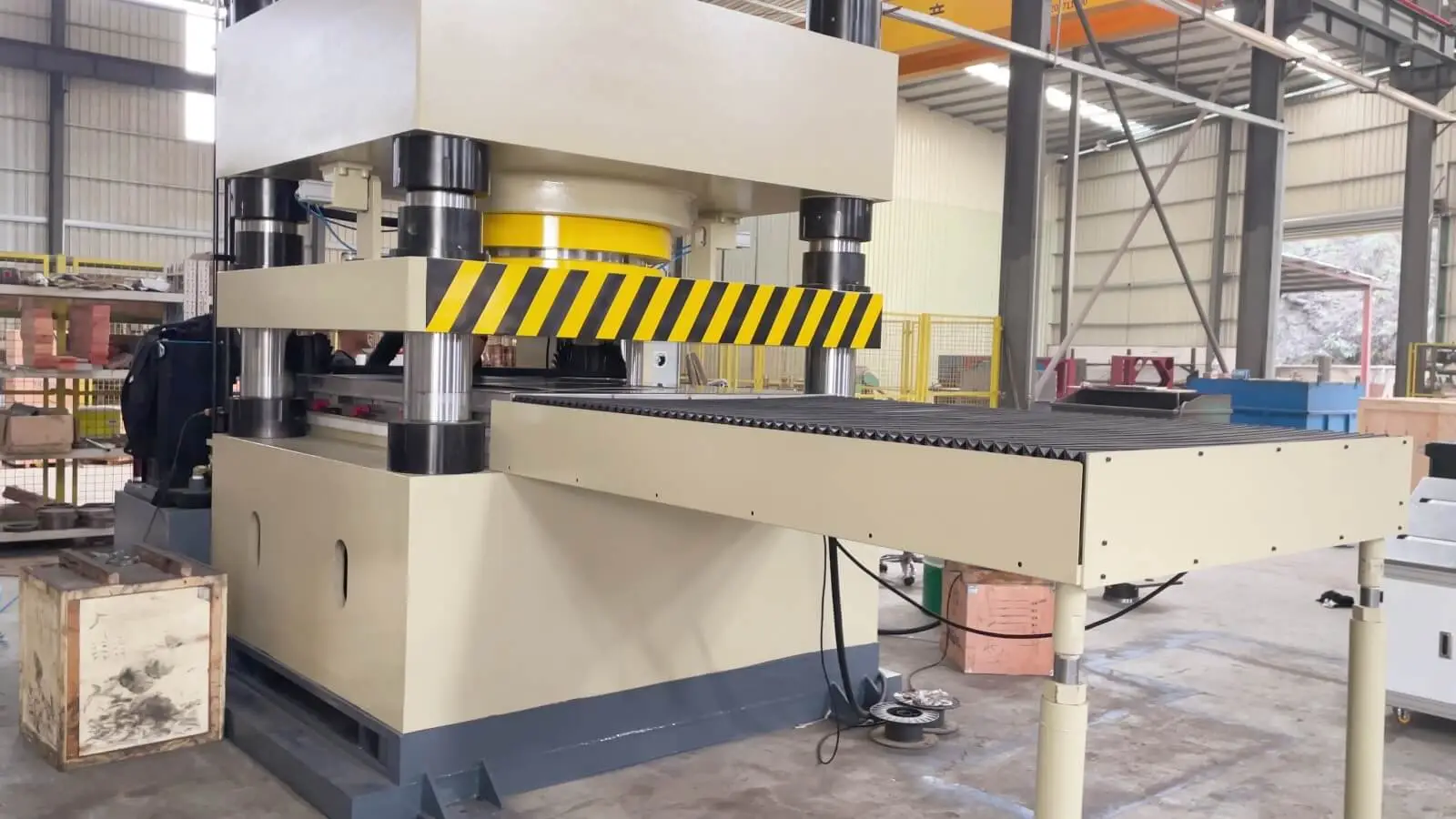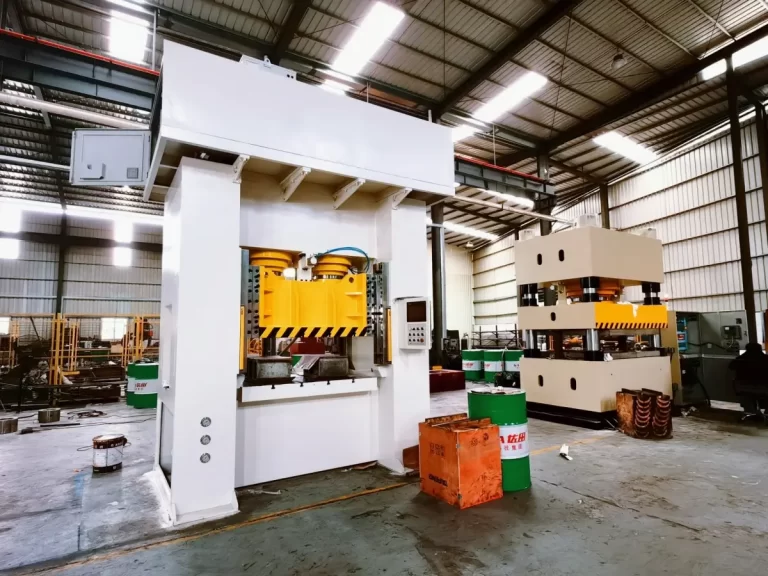What Is a Servo Hydraulic Press?
A servo hydraulic press is a type of hydraulic press that combines electronic and hydraulic systems. It leverages the advantages of both, namely the high-pressure characteristics of hydraulic systems and the high precision characteristics of servo control systems. Its components typically include a servo motor, servo controller, sensors, hydraulic valve group, hydraulic pump, HMI, and more, forming a closed-loop control system. Servo hydraulic presses are widely used in various processes such as punching, die-cutting, drawing, and compression molding.
6 Major Differences Between Servo Hydraulic Press and Conventional Hydraulic Press
Energy Consumption
In actual use, servo hydraulic presses usually save 50%-70% of electricity consumption compared to conventional hydraulic presses, which is a staggering figure. In the United States, this means savings of tens of thousands of dollars in electricity bills per year for a 1000T machine. If your factory has many machines, replacing them with servo types will save a significant amount of money each year.
- In most cases, the idle time of hydraulic presses is significantly greater than the working time, often even in a ratio of 3:1. The servo motors can adjust output power in real time, resulting in no energy wastage during idle periods and real-time energy adjustment at partial loads. In contrast, conventional hydraulic presses are fixed and will not adjust output power in real time according to load conditions, resulting in energy waste.
- The heat generation of the hydraulic system is approximately 20% of that in conventional types, and the servo motor also produces less heat while dissipating it more effectively.
- The servo motor adopts advanced permanent magnet synchronous motor technology, resulting in fewer mechanical transmission losses and more efficient control strategies, thus achieving higher electrical energy conversion efficiency.
- The Servo motor has no mechanical transmission losses and employs a brushless design.
- During the pressure-holding stage, the servo motor operates at zero speed, greatly reducing energy consumption.
Price
Servo hydraulic presses are generally more expensive than conventional hydraulic presses due to the cost of their complex closed-loop control systems. While this may pose a certain burden for cost-sensitive enterprises in the initial stages, it is merely a one-time investment cost. In the long run, servo types offer greater long-term benefits.
- The servo motor is more expensive than a regular motor, sometimes several times more costly.
- The servo closed-loop control system has higher precision requirements for controllers, sensors, hydraulic pumps, and hydraulic valve groups, increasing accessory costs.
- Servo hydraulic presses require dedicated servo drives, which are more expensive than the inverters used in conventional types.
- Servo hydraulic presses incur higher maintenance costs compared to conventional types. This is due to the complexity of servo closed-loop control systems, which require regular inspections and maintenance, consequently increasing the cost of replacing components.
Positioning Accuracy and Pressure Accuracy
Servo hydraulic presses offer superior positioning accuracy, typically within ±0.01mm or even higher precision, and pressure accuracy within ±0.5% to ±1%. In contrast, conventional hydraulic presses have a positioning accuracy level of approximately ±0.1mm and pressure accuracy of around ±3%. This precision is achieved through precise control and more stable pressure rise and fall thanks to the servo control system.
- Servo control systems constantly monitor and adjust the hydraulic system’s output, enabling precise control of pressure, speed, and position.
- Conventional hydraulic presses have relatively poor centralized scheduling capability, making it difficult to make real-time adjustments during operation and resulting in lower precision.
- The control algorithm of the servo hydraulic press is more advanced, with a smaller error. It can monitor and remove defective products at all stages, significantly reducing the scrap rate.
- When applying pressure to metal, the closed-loop control system monitors the metal’s rebound in real-time and adjusts the output torque accordingly, significantly reducing metal deformation.
Speed
Servo hydraulic presses outperform conventional types in processing speed, achieving speed improvements of 30%-60%. This is due to the quick response characteristics of servo control systems, resulting in faster and more flexible processing speeds.
- Its design objective is to pursue high dynamic performance, allowing for rapid startup, variable speed, and direction changes.
- The real-time monitoring capability of the servo control system makes each motion more efficient, thus enhancing processing speed.
- The actuator of the servo hydraulic press has a smaller mass, resulting in a relatively lower inertia load, which means it can respond more quickly.
Noise
Servo hydraulic presses generate approximately 50% less noise than conventional types. Additionally, they can adjust their output based on the load, ensuring lower noise levels.
- The servo motor operates very smoothly, with no vibrations occurring during both low-speed and high-speed operation.
- Servo motors use a brushless design, avoiding the noise associated with mechanical clutches.
- Conventional motors require current for excitation, resulting in electromagnetic noise.
Lifespan
Statistically, the lifespan of a servo hydraulic press is generally about 30% longer than that of conventional hydraulic presses. With regular maintenance and inspections, it is possible to extend this lifespan by over 60%. However, these estimates are subject to specific environmental factors such as the working environment’s harshness, workload, regular maintenance, and compliance with usage standards.
- Servo motors employ brushless designs, eliminating wear issues.
- The servo closed-loop control system has stronger coordination capabilities with safety systems, hydraulic systems, and various sensors, resulting in smoother machine operation and better protection against overload, overcurrent, and excessive stress.
Conclusion
Apart from being more expensive, servo hydraulic presses outperform conventional types in terms of energy consumption, processing speed, positioning and pressure accuracy, noise level, and lifespan. These advantages are particularly evident in high-end machining and precision molding fields. Currently, they are increasingly adopted by hydraulic press manufacturers, becoming a trend in the industry.
The Lexson series under Velxun offers a range of hydraulic presses, including trimming press, puzzle making machine, heated platen press, and more, all equipped with permanent magnet synchronous servo hydraulic systems. We provide customized hydraulic press solutions tailored to your industry needs. If you have any inquiries, please feel free to consult our expert team.

